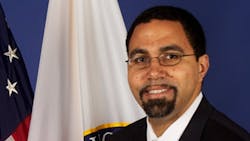Education secretary urges charter schools to cut back on suspensions
U.S. Education Secretary John King is calling on charter schools to reduce their reliance on student suspensions and rethink how they handle discipline so that more students remain in the classroom.
"I want to ask you to take on a challenge that desperately needs leadership and innovation—rethinking discipline," King told those attending the National Charter School Conference in Nashville.
Noting that nearly 3 million students were suspended from public schools during 2013-14 and that charter schools suspend a higher percentage of their students than traditional schools do, King urged charter school administrators to take the lead in finding alternatives to discipline that removes students from classrooms.
"The end goal isn't just to reduce suspensions or expulsions," King says. "It is to help our students learn how to succeed in whatever setting they find themselves, in school and beyond."
Students who receive school suspensions are more likely to be held back a grade or drop out subsequently; those students also are more likely to come into contact with the criminal justice system. African American students, King noted, are suspended at a rate nearly four times that of white students and are more likely to be suspended in charter schools.
"My challenge to you," King says, "is this: don't get caught up in battles about whether charters are a little better or a little worse than average on discipline. Instead, focus on innovating to lead the way for the sake of our students.
"We know that, in every school, no matter how successful, there is more we can do to reach the students who are not yet succeeding and more we can do to equip students with not just the fundamental academic skills, but the socio-emotional skills needed for success in life. That is the spirit with which we must approach the work of rethinking discipline.
"We need safe and positive school environments, but as we consider struggling students we must ask ourselves critical questions: Could socio-emotional supports like counseling or mentoring relationships make a difference? Could instruction be strengthened to achieve better engagement or more appropriate differentiation? Could training on issues of implicit bias or culturally relevant pedagogy change the outcome of a particular interaction? Could parents or family members be engaged more effectively as partners? Could more learning time yield a better outcome than exclusion from the learning environment?"
Noting that he was the co-founder of a charter school—Roxbury Prep in Boston—King acknowledged that the issue of how to handle school discipline was complicated.
"What I know from those experiences, and what I've learned since, is that discipline is a nuanced and complicated issue," the secretary said. "Yet the public discussion of these issues is often binary—pitting one extreme against another. It's 'zero tolerance' or chaos. Authoritarian control or no discipline at all.
"So, I'll say up front: I am not here to offer any hard-and-fast rules or directives. But, I believe the goal for all schools should be to create a school culture that motivates students to want to do their best, to support their classmates and to give back to their community, and to communicate in ways big and small to our students and educators that their potential is unlimited."
About the Author
Mike Kennedy
Senior Editor
Mike Kennedy, senior editor, has written for AS&U on a wide range of educational issues since 1999.
